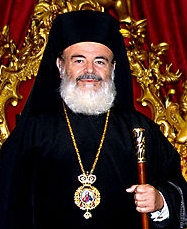Also known as:
Αρχιεπίσκοπος Χριστόδουλος
More People of Greece
More Topic Categories
Related Destinations
Archbishop Christodoulos (17/01/1939 - 28/01/2008)
 Christodoulos was the Archbishop of Athens and all Greece from 1998 until his death in 2008.
Christodoulos was the Archbishop of Athens and all Greece from 1998 until his death in 2008.He was born in Xanthi on 17 January 1939 to immigrant parents. Two years later, after World War II had broken out, his family moved to Athens for security reasons. He attended school at Korais elementary and Leontion high school, while in 1962 he completed his first university degree at Law School of the University of Athens. Five years later, he also completed his studies at Theology School of the same university; at the same time he studied Byzantine music at the Conservatory of Athens. In 1982, he submitted his doctoral thesis at Theology School of the Aristotle University of Thessaloniki.
In 1958, along with two other clerics, he founded the monastic brotherhood “Chrysopigi” in Athens, mainly organizing humanitarian and philanthropic actions, as well as running Sunday schools. He became a monk in 1961 at the Varlaam Monastery of Meteora, and he later worked as a priest at Palaio Faliro, Athens, for nine years. Afterwards, he became Chief Secretary of the Holy Synod of the Church of Greece. In 1974, at age 35, he became the youngest bishop of the Church of Greece, as he was elected Bishop of Dimitrias and Almyros. In 1998, he was elected Archbishop of Athens and all Greece.
As bishop of Dimitrias and Almyros, he founded many non-government organizations, helping the elderly, the poor and the youth. He also offered scholarships on behalf of the Bishopric, created summer camps for children and a radio station. When he became Archbishop, he created 14 Synodic Committees that dealt with a vast array of contemporary problems, including bioethics, human rights, child protection, the rights of women, refugees etc. He founded more NGOs, instituted a financial aid for families with three children living in Thrace, and helped in the organizing of various conferences and congresses.
Archbishop Christodoulos tried to make an opening to the youth and “speak their language” that was successful, as the number of young people visiting churches increased. In 2000, there was a clash between the Church and the State, concerning whether a citizen’s religion should be mentioned on the national ID cards. After many protests, Christodoulos asked for a referendum on the matter, providing over three million signatures of consenting Greek citizens. It was declined by the Greek President, and the government eventually removed the “Religion” field from the IDs. More conflicts with the State followed, mainly because Christodoulos expressed opinion on matters that bordered with politics.
In June 2007, he was diagnosed with colon cancer and had a successful removal operation. However, during the operation, a second cancer had been found in the liver, as well as cirrhosis, a result of chronic hepatitis. A transplant was found but the operation was cancelled, as multiple metastases had been found. On 28 January 2008, he died at his home, unwilling to be admitted to hospital. A four-day national wake was announced by the government. Despite the controversy over him, Archbishop Christodoulos remains one of the most popular archbishops in Greece, especially because of his particular appeal to young people.
See Also:
 Athens Photos
Athens Photos
 Santorini Photos
Santorini Photos
 Crete Photos
Crete Photos
 Meteora Photos
Meteora Photos
 Corfu Photos
Corfu Photos





